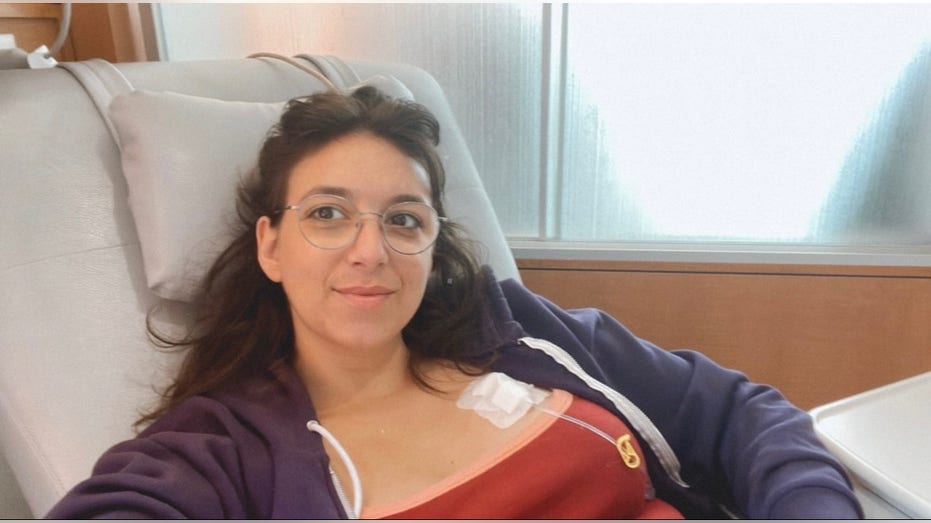Terminal colon cancer patient saved by breakthrough treatment
A Minnesota woman was told her stage 4 colon cancer couldn’t be cured. Two years later, she’s cancer-free — and says a last-chance clinical trial gave her back her life.

Two years ago, Emma Dimery was told her stage 4 colon cancer was incurable. Today, she is healthy and cancer-free — and she says a last-resort clinical trial saved her life.
Dimery, who lives in Minnesota, was just 23 when she was diagnosed with colon cancer, which has been rising sharply among teens and young adults in recent years.
After experiencing abdominal pain and having abnormal blood work, Dimery underwent a colonoscopy, which revealed a "softball-sized" tumor and another "golf ball-sized" one, she told Fox News Digital.
ALTERNATIVE CANCER TREATMENT COULD REPLACE CHEMO AND SURGERY, STUDY SUGGESTS
Despite multiple surgeries, chemotherapy, radiation and some combination therapies, Dimery’s treatment-resistant cancer spread throughout her body over the years, leading to what she described as a "low point."
"I was basically treading water, doing immunotherapy every other week for probably four years or so," she told Fox News Digital during an on-camera interview, adding that she was "out of options." (See the video at the top of the article.)
"I had been waiting for a clinical trial," recalled Dimery, now 35. "I had exhausted every other standard of treatment, and even some not-so-standard ones."
When Dimery heard about a new trial at the University of Minnesota, she said it "wasn’t a tough decision."
"I was on board pretty much from day one," she said.
The trial, led by Dr. Emil Lou, tested an experimental genetic therapy that the researcher described as the "next frontier of immunotherapy."
WOMAN SAYS DOG DETECTED HER BREAST CANCER BEFORE DOCTORS DID: 'HE'S KNOWN THIS WHOLE TIME'
While most immunotherapies have targets that are on the outside of cells, this one targeted the insides of cells.
"Some of the targets inside the cell are preventing the immune system from activating against the cancer," Lou, a medical oncologist and scientist who had previously treated Dimery, told Fox News Digital in an on-camera interview. "It’s kind of like a shield that protects the cancer cell from the body’s immune system."
In the trial, cancer cells were retrieved from the participants, then were altered in a lab using CRISPR-Cas9 gene editing technology, which Lou described as "genetic scissors." The process programmed the cells to have a more effective anti-tumor response.
The altered cells were then reintroduced into the patients’ bodies via infusion.
"They trained the cells to be able to fight my cancer specifically when they were reintroduced into my body," Dimery noted.
It was a long process that was grueling at times, she shared, with some challenging side effects.
"You just get through it and try to focus on the good," Dimery said. "And I had a lot of good around me. I had really amazing support team."
A total of 12 patients participated in the study — but Dimery had by far the best results.
The vast majority of advanced colorectal cancers are not considered to be curable, Lou confirmed to Fox News Digital.
"The chemotherapies or whatever other treatments we have available, while there are a number of them, are palliative — meaning they don't have the capability to induce a cure in patients with metastatic stage 4 colorectal cancers," he said.
"Emma was in that category until she came onto our trial."
Lou described Dimery’s response to the experimental immunotherapy as "remarkable." After just one infusion of the engineered cells, she was pronounced cancer-free — an outcome that is "almost unheard-of" with advanced colorectal cancer.
"We term this in oncology as a ‘clinical complete response,’ which is something that you see in 10% or less of all patients," Lou said. "And it’s less than 10% for stage 4 colorectal cancers."
WOMAN SAYS CHATGPT SAVED HER LIFE BY HELPING DETECT CANCER, WHICH DOCTORS MISSED
"What we saw in Emma was a magnificent and unprecedented level of response, going from a metastatic stage for an otherwise incurable cancer … where now we don’t see any cancer."
Two years after the trial, Dimery said she’s doing "really well."
"The trial worked almost immediately — and I've had no evidence of disease since," she told Fox News Digital.
While she’s hesitant to use "the C-word," or "cure," she said the trial has changed the way she thinks of cancer.
"Until now, the best I could hope for was remission to the point of no evidence of disease … and had to accept that it could rear its head again at any point, even if they can't detect it on a scan," Dimery said.
"All of my scans have just been coming back better and better."
Dimery’s story was unveiled last week at the American Association for Cancer Research (AACR) Annual Meeting in Chicago.
"Emma is exceptional in many ways, but what we learned from her case, we hope to replicate and decipher how we can achieve this on a more consistent basis across the board for more patients like her," Lou added.
Studies have shown that in 2023, one in 10 colorectal cancer diagnoses were considered early-onset, or affecting patients under 50 years of age.
The American College of Surgeons predicts that early-onset cases will double by 2030.
"Colorectal cancer remains one of the few cancers for which we have validated screening tools," Lou noted.
Those include blood-based tests, stool-based tests and colonoscopies.
In 2018, the American Cancer Society changed its colorectal screening recommendation from age 50 to age 45. Other medical organizations followed suit in ensuing years.
Even so, Lou said he is seeing patients diagnosed well ahead of the age 45 benchmark.
"I'm seeing something in the last five or six years that I really did not see earlier in my career — teenagers, people in their 20s, 30s and 40s," he shared.
"Just last week, I saw someone in their early 40s with widely metastatic stage 4 colorectal cancer."
CLICK HERE TO SIGN UP FOR OUR HEALTH NEWSLETTER
What’s "striking and alarming," Lou said, is that about half of the cases of colorectal cancer are diagnosed at stage 4.
"A lot of times, they don't even have symptoms, or they have symptoms that were construed as something else."
Dimery said she is encouraged by early-onset colon cancer coming to the "forefront of public consciousness."
The more people who are aware, the better. I think it's really important to not panic, but to stay informed and connected to the community."
For more Health articles, visit www.foxnews.com/health
Genetic testing is also important to gauge the availability of clinical trials, she noted.
"That can tell you a lot about your individual type of cancer," Dimery said. "Luckily for me, I had just the right kind of cancer for this treatment."



















_Alexey_Kotelnikov_Alamy.jpg?width=1280&auto=webp&quality=80&disable=upscale#)



















































